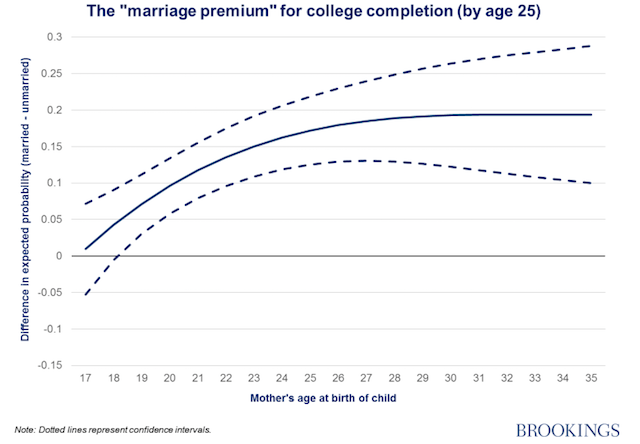Highlights
How much does marriage benefit children? In a recently released paper, economists Melissa Kearney and Phillip B. Levine emphasize that the simplest way to answer this controversial question is “it depends.” Is the child’s mother young or old? A high school dropout or a college graduate? And what outcomes are you examining—ordinary milestones such as completing high school, or more difficult achievements like attaining a college degree? Their analysis of a large longitudinal study yielded intriguing results. When it comes to ordinary milestones, marriage appears to confer the greatest advantages on the children of middle America, while the children of older and highly educated mothers enjoy the greatest marriage premium for earning college degrees.
For the sake of background, bear in mind that parents contribute to their children’s well-being through many channels: not just their time and money, but also through their parenting strategies, household stability, personal and psychological health, and social networks. Such resources are more plentiful among mothers who are older and more educated, so the researchers looked at mothers’ age and education level in addition to their marital status (all at the time their child was born). Because people tend to pair up with someone whose resource level or socioeconomic status is similar to their own, Kearney and Levine assume that children with disadvantaged mothers also had disadvantaged fathers.
Thus, they expected that having married parents would not necessarily make a big difference for children born to women at the very bottom of the socioeconomic spectrum. “For some women,” they propose, “a partner’s additional contributions are not sufficient to alter children’s outcomes.” Yet “for other women, a partner’s contributions are not necessary” for ensuring that children complete high school and avoid poverty in young adulthood. A well-educated woman may have enough resources that she can help her kids reach these goals even without access to her partner’s (presumably extensive) contributions.
Data from the nationally representative Panel Survey of Income Dynamics bear out Kearney and Levine’s hypothesis to some extent. Among children born in the 1960s, 1970s, and 1980s, those with mothers aged 20 to 24 and of middling education—a high school diploma but no college degree—showed the largest “marriage premium” when it came to finishing high school and avoiding poverty in young adulthood. Children of both more disadvantaged mothers and more advantaged mothers also did better if they were born to married parents, but the gaps between children of married parents and single moms were smaller for these groups.1
The story was different for the more challenging outcomes of earning a college degree and a high income at age 25 (above 400% of the federal poverty line). Young men and women born to married parents were more likely to achieve these markers of success than their peers born to unmarried parents, with the marriage premium increasing as mothers’ age and education level rises. When a mother has more resources, her partner is likely to have more resources, too, meaning that marriage is particularly advantageous to her children for outcomes closely linked to parental resources. In concrete terms, the gap in college graduation rates between young adults born to married parents and those born to single moms was relatively small among those with teen mothers and grew to reach almost 20 percentage points among those with mothers in their late twenties or older, as the figure below illustrates.2 Since only 36 percent of 25- to 29-year-old Americans had a bachelor’s degree as of 2015, a boost of 20 percentage points is considerable.

Source: Kearney and Devine, "The 'Marriage Premium for Children' Depends on Family Resources," Brookings Institution, 4/13/17
The million-dollar question, for parents and policy-makers alike, is how these marriage premiums arise. Although Kearney and Levine explain that they were not trying to demonstrate that the relationship between marriage and child outcomes is causal, they did make some effort to investigate the role of income. Perhaps surprisingly, controlling for average family income in early childhood (in addition to demographic factors mentioned in the footnotes below) did not greatly change the marriage premium for avoiding poverty or completing high school. Per the researchers, that could mean that the marriage premium is instead explained by parental time, household stability, or other resources linked to marriage, or simply that a family’s income in early childhood is an insufficient measure of family income across the child’s life. Nor did average family income early in a child’s life appear to drive the link between parental marriage and a higher income in young adulthood. In contrast, controlling for family income notably lessened the marriage premium for college completion (by up to five percentage points).
Kearney and Levine sum up their results in this way: “the marriage premium depends crucially on resource context.” As married and unmarried mothers become less and less alike—gaps in age, education, and income between the two groups have widened over the past few decades—it will be increasingly important to build on these economists’ framework if we want to ensure that all children have a decent chance of success in life.
Anna Sutherland is a writer and editor living in Michigan.
1. When the researchers controlled for child’s gender, race, ethnicity, and year of birth, the marriage premium for avoiding poverty and completing high school shrank but persisted. For the youngest and oldest mothers, it became statistically insignificant.
2. The figure controls for child’s gender, race, ethnicity, and year of birth. Controlling for these demographic factors did not much change the magnitude of the marriage premium for graduating college or earning a high income.














